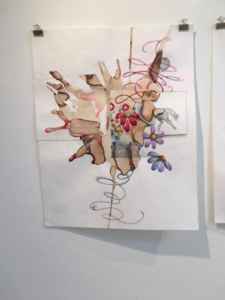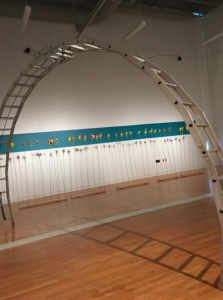
Feb 16, 2018 | Exclusive |
By Nicole Stewart, Staff Reporter
UMF Division of the Arts is featuring the exhibition “Rough Drafts,” a special art event dedicated to show off art from all of the UMF Art faculty.
The professors featured in the show include Ann Bartges, Tom Jessen, Dawn Nye, Elizabeth Olbert, Jesse Potts, Katrazyna Randall, and Barbara Sullivan. The show offers multiple forms of art, ranging from sculptures, drawings, paintings, and animations. The show is a way to bring the community together to see what the different art styles that th

Nye utilizes color among other techniques to depict subtle differences in society (Photo by Eryn Finnegan)
e Art faculty have, as well as offer different perspectives of the modern world
Dawn Nye, one of the professors involved with “Rough Drafts,” has her artwork on display. In an email interview, Nye reflected on favorite parts of the gallery. “I think this exhibit shows the diversity in our faculty, which makes me proud,” said Nye. “We are such a small institution, and we’re lucky to have such great people teaching here.”
Nye has two different pieces in the UMF Gallery. “The first is an animation called ‘Daydream Narcolepsy.’ This short deals with ideas of escape and distraction. The second piece is a hand painted woodblock series called ‘Public.’ This piece deals with divisions in our society–though not in a direct way,” Nye said.
According to Nye, the preparation began a few weeks prior to the opening. The Art department have been working to set up in the Flex Space and UMF Art Gallery. Nye mentioned how the gallery also helps the professors who are involved. “All of our faculty are working artists. Exhibiting and working in studio not only help us to develop our careers, it also helps us to become better teachers.”
The professors worked hard to complete this project, and Nye noted her favorite pieces among the others who are involved with the gallery. “One of my favorite moments is in the Flex Space at the Emery Arts Center, where Jesse Potts’ and Katrazyna Randall’s pieces are in view together. They have such different aesthetics, but somehow they seem to connect to each other,” said Nye.
On opening night, both

Jesse Potts’s Arc and Katrazyna Randall’s piece interact in subtle ways in the Flex Space
(Photo by Eryn Finnegan)
UMF students and the general public came to the show. The gallery had a wide arrangement of displays from projections to sculptures on the wall. The entire studio was filled from the first floor to the second floor in the art gallery on campus. In Emery, the displays featured portraits and sculptures done by the faculty involved.
For those who are interested, Rough Drafts is being presented in Emery Community Arts Center Flex Space and the Art Gallery. The show is open on Tuesdays through Sundays from 12PM-4PM until March 9th. Students and faculty can visit the website at artgalleryumf.org.

Feb 16, 2018 | Feature |
By Keely McConomy Contributing Writer
Ryan Smith, one of the new assistant coaches for the UMF Track and Field team, is excited to help train student athletes. His goal as the assistant coach is to “make this sport a tradition” and “to elevate Maine running,” Smith said.
Smith competes in professional running as well as coaching at UMF. Smith mostly works with l

New Assistant Coach Ryan Smith. (Photo Courtesy of UMF Athletics)
ong distances runners, supporting head coach Daniel Campbell. Smith and Campbell work together to help the student athletes improve as runners and people.
“Dan helps me coach the big picture,” said Smith.
Though Campbell has an outstanding reputation for his coaching career, Smith has brought some newer ideas to UMF that could help the team improve in many ways. Smith’s philosophy on coaching is all about planning for the future.
Chloe Kenyon, a sophomore and second year Track and Field athlete at UMF, said Smith “goes from [the month of] May when we want to be at our peak and builds the workouts backwards from there.” Smith “is always excited at practice,” said Kenyon.
Running is a mental and physical sport; helping the athletes prepare for the outdoor season is vital to their success. Smith loves coaching so much that he tells all his athletes that he will always be happy to help them continue the sport, even after they are done running for UMF.
“For me, I’d love to stay here,” said Smith.
He hopes to coach at UMF as long as he can and continue putting his best efforts into helping student athletes become the most successful they can be.
Smith is a recent graduate from Goshen college in Indiana, where he was an All-American runner. He started competing in Track and Field in high school, and his goal from the first day was to beat the high school’s record for the five kilometer. He was told beating the record was impossible. By his senior year he proved his doubters wrong by beating the record by one second. At UMF, Smith wants to bring a similar legacy.
UMF will be competing in the Maine State Open at the University of Southern Maine on February 24th. The meet is important to Smith and the UMF team because teams from nearby states will also be competing with all the Maine teams. “It’s an effort to draw people from out of state and show them, ‘Hey we can compete too,’” said Smith.

Feb 16, 2018 | News |
By Caitlyn Raye Contributing Writer
Right now, many UMF students are either beginning the vigorous search for an apartment or choosing the easier option of life on campus in the residence halls.

Foothills is one of the many companies that students rent apartments through. (Photo by Eryn Finnegan)
Kelsey Champagne-Smith, the Assistant Director of Housing and Academic Success at UMF, explained in an email interview that the number of students on campus compared to students off campus is about half of the UMF population. When asked if UMF loses students to apartment companies each year, Champagne-Smith explained, “I don’t know if I would say we lose students to apartments. If you mean from year to year how many students do we retain in our campus housing, then that would be around 63 percent.”
The price of living on campus varies depending on the type of room a student lives in and the meal plan chosen. The average cost of a double room is $2519 a semester and the meal plans vary depending on year at UMF. Freshmen, however, are required to have meal plan A, which costs $2148 a semester. For a room and a meal plan on campus, a freshman will be paying around $4667 a semester, totaling $9334 for a whole year.
Kimberly Day, a junior at UMF, explains the decision to move off campus by saying that “living on campus is ridiculously expensive and you can save a lot more money by moving off campus.”
Day is convinced that living off campus is cheaper. “Based on doing the math, you save a pretty good amount of money but it is different for everybody because it depends on what your financial aid package is too and how much you will be getting back as a refund at the end of it,” Day said. “For me, I know I will be saving at least a couple thousand dollars by moving off campus.”
Day will pay approximately $380 a month for her apartment. Day has also calculated that the apartment will cost around $4600 a year, not including outside expenses like groceries.
Day explained other reasons for moving, such as “having the responsibility of my own place and having my own space and not having to share things like bathrooms.” Day also explained that a big pro of being off campus “would be not having to eat dining hall food.”
Although a student may be off campus, they still have access to the dining hall. Students living off campus have the choice to purchase a voluntary meal plan.
Kelsey Brann, a sophomore at UMF, lives in the Frances Allen Black (FAB) residence hall. Brann explained that the decision to stay on campus next semester was due to campus being convenient.
“It’s good to live on campus so you know where things are for the first year or two but I wouldn’t recommend all four years,” Brann said.
Brann does plan to move off campus at some point, but described the advantages to living on campus. Brann said that “the dining hall and snack bar are close by, so I do not have to cook for myself, as well as having my friends a short walk away.”
Champagne-Smith agreed and provided the pros of living on campus by saying, “living on campus provides students with secure housing and access to food through our dining services. Additionally, students who live on campus are able to interact with their peers, faculty, and staff on a regular basis. Programming such as CA events, the Landing Events, and club events are also easily accessible by students who live on campus. In Student Life, we hope that living on campus encourages personal and professional growth for UMF students through leadership opportunities and involvement in the community.” Champagne-Smith however did not provide any cons of living on campus.
Feb 16, 2018 | News |
By Olivia White Contributing Writer
UMF is showing its support for the #metoo movement by hosting “The Vagina Monologues,” a play by Eve Ensler based off of interviews from over 200 women speaking out about about sexual assault and abuse experiences in February.
People everywhere are voicing their views on sexual harassment and sexual assault through #metoo, a social media hashtag that opens a space for people to share their stories on being sexually harassed and/or assaulted.
Alyssa Leonard, a freshman at UMF, said she “can’t really relate to #metoo personally, but just knowing so many people that do makes me genuinely sick. No one should ever have to go through something like that.”
Other student’s views echo Leonard’s position, arguing that sexual assault is a horrible thing, or they avoided answering the saying they felt uncomfortable talking about the subject.
The students of UMF have expressed their views on campus awareness and precautions. Sophomore and Clefnote member, Vanessa Brown said that, “as cliché as it sounds, campus awareness is unity. Whether its physical, verbal, mental, emotional….unity is the strength in which all hopes and fears are destroyed.”
Brown also said the campus should be encouraging the students, “to create safe spaces, to incite discussions, to allow all stories be an important one.”
Some students on campus are not used to sexuality being so public and outspoken and it makes many uncomfortable. Others feel as though they cannot express their thoughts for fear they may have the “wrong” opinion in the minds of their peers.
When asked how she thought sexual assault could be prevented on campus, Leonard said “a good idea would be to have conversations. I know there’s something on campus happening called ‘The Vagina Monologues,’ where they are talking about sexual harassment.”
The cast for this year’s production are students from UMF, who will be under the direction of Gavin Pickering, a counselor here at UMF. The characters delivering monologues talk frankly about sexuality as a whole and women’s perceptions of their bodies. “The Vagina Monologues” will be held at the Emery Arts Center at 6 p.m. on February 23rd.
Sexual Assault Prevention and Response Services (SAPARS) along with Safe Voices are organizations that helps those who have experienced a form of sexual assault. If you need help please contact one of these organizations; SAPARS: 207-778-9522 or 1-800-871-7741, Safe Voices: 207-778-6107 or 1-800-559-2927, and/or Non-Crisis Peer to Peer Support: 1-866-771-9276.
Feb 16, 2018 | News |
By Nicole Stewart Staff Reporter
The Federal Communications Commission (FCC) voted a 3-2 repeal of Net Neutrality in December. Without Net Neutrality, internet service providers can control the content seen on websites and block out what they do not want people to see, as well slowing down the speed of their customer’s internet. If a user wanted to gain faster speed, they would have to pay for it.
Although there are still more steps the repeal has to go through before becoming official, there is worry for what the lack of an open internet could mean. For college students, this repeal could make getting assignments done a challenge in the future. Students who work for the I.T. department voiced their reservations about what it could mean for classes and using social media.
Bethany Haynes, a sophomore and IT student worker, expressed thoughts on what could happen if people were charged for using individual websites in addition to paying for internet access. “When I first found out about it, I was pretty angry,” said Haynes. “It would make doing schoolwork hard, as it could mean more expenses for students who already have to pay for their Internet service provider.”
Haynes added, “People who aren’t able to pay their Internet bill now because of the change, are going to have hard time accessing these websites… For school, that would be a bad thing, obviously, because we need access to these websites.”
Another IT student worker, freshman Zachary Petcher, believes it will be rough for students to do their coursework. “It’s just making it challenging, and we would have to pay more money for. It’s just not ideal.”
As university is already expensive for students, the additional cost of paying to use the Internet for school or for recreational usage might be hard for students to afford even though it is a basic need in modern life.
States across the country have been fighting against the repeal of Net Neutrality by trying to sue the FCC. Maine is one of the states that is going against the FCC to keep the usage of free Internet.
Both Petcher and Haynes believe that paying for using social media websites would make it tough on students. “It’s just more money that we’re going to be forced to spend to get these basic things that we have been reliant on, and are becoming more reliant on,” said Haynes.
The Internet is a tool many professors use in class, and students are often required to use it for homework assignments. If students had to pay to access class-related websites, assignments may be tough for students to complete.
Haynes admitted she was unaware of Net Neutrality until the issue arose back in December. “We just want Internet. We just want nice Internet,” said Haynes, who urged students to keep on voicing their rights on this issue. “Keep fighting for it. The last thing we want is to spend more money.”




